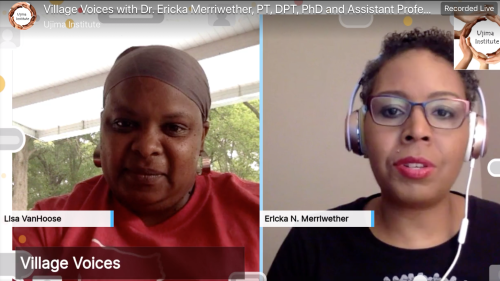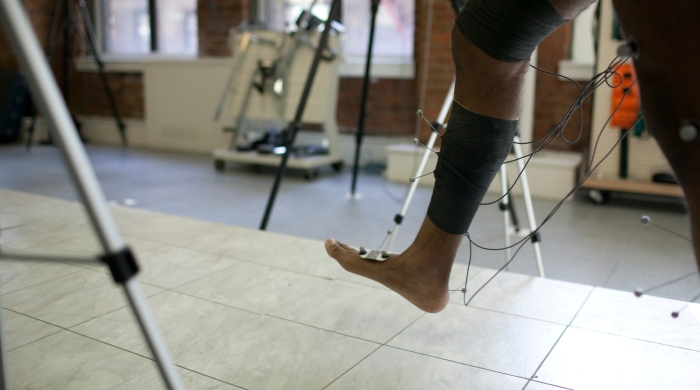Dr. Ericka Merriwether is an assistant professor in the NYU Steinhardt Department of Physical Therapy and Director of the Inclusive and Translational Research in Pain Laboratory (I-TRIP). We sat down with Dr. Merriwether to discuss part of her research that examines relationships between chronic pain and race- and weight-based discrimination.
What inspired you to study chronic pain specifically?
I’m drawn to studying this topic because there is so much that is still unknown about the mechanisms and management of chronic pain within the context of other medical conditions. For example, chronic pain is highly prevalent in adults with obesity, but treatment options for pain relief are limited and not as highly prioritized as those for other comorbid conditions (like diabetes or cardiovascular disease).
Additionally, both chronic pain and obesity are stigmatized by society, which I think greatly impacts patients' willingness to engage healthcare providers about either condition.

Dr. Ericka Merriwether recently spoke with Dr. Lisa VanHoose of the University of Louisiana at Monroe about pain and adult obesity as a part of a Facebook Live hosted by the Ujima Institute, a wellness institute for Black women.
What types of stigma do individuals with chronic pain and obesity face?
It's like chronic pain is seen as a punishment for or a negative consequence of obesity, which is wrong. We wouldn't tell a patient with diabetes to wait until their glucose levels are under control to give them medicine – why would we tell a person with obesity to wait until they lose weight to address their chronic pain? There is some evidence that weight loss reduces pain, but many of those studies feature very restrictive diets or surgical intervention.
Further, many physical therapists and other healthcare providers fail to adequately counsel patients on weight management due to limits on time and lack of training. Weight loss leads to better health outcomes for sure, but a patient shouldn’t have to wait to lose weight for pain relief. That’s my driving force.
How do you go about studying discrimination and chronic pain?
I’m collaborating with a lab to examine the potential role of weight and racial discrimination on pain intensity and pain interference in a cohort of adults with obesity participating in a behavioral weight management intervention. Participants were asked whether they have experienced discrimination based on their weight and/or race over the previous year and their lifetimes.
We have some interesting findings that we presented at the NIH National Cancer Institute Cognitive, Affective, and Social Processes in Health Research (CASPHR) annual working group meeting that we’re in the process of publishing. Our findings suggest that racial and weight discrimination are highly prevalent in a cohort of adults with obesity and that more experiences with racial and weight discrimination are associated with more pain. Further, gender appears to moderate this relationship; the relationship between racial discrimination and pain interference is stronger is cisgender women. There is still more to figure out, but we think this has the potential to include weight discrimination as a social determinant of chronic pain.
You’re also studying chronic pain at the biological level, right?
Yes – I’m currently working with a group conducting a bariatric surgery study at NYU Langone Health. They’re collecting biological samples from patients before surgery and out for two years afterward so we can observe changes longitudinally. They’re also tracking patient pain using the Brief Pain Inventory, which measures reported pain severity and pain interference. I’m looking at mediators of metabolism and inflammation in samples of fat tissue and plasma to develop methods to find biological markers of chronic pain in adults with obesity.
How do you hope your research will benefit those with chronic pain?
Currently, one of the major interventions that doctors across different specialties prescribe adults with obesity is physical activity as a part of a multi-modal approach. I’m a proponent of physical activity. But I’m also a big proponent of asking people why they’re not physically active. If pain is a barrier, and if we know how to address it, maybe a patient will be more apt to be active. My hope is that if I better understand some of the mechanisms, we can either use the rehabilitative interventions that we have and optimize them or find something new to better address pain in addition to precision medicine weight management.

Clockwise from top left: Dr. Bernadette W. York, Dr. Lisa VanHoose, Dr. Ericka Merriwether, and Dr. Hadiya Green-Guerrero. The panel discussed health disparities brought to light by COVID-19 in an APTA Facebook Live.
As a health disparities researcher, how does your work tie into current conversations about systemic racism in America?
When we were in the teeth of COVID-19, data emerged showing that individuals who identify or are raced as Black/African-American and LatinX were becoming infected at higher rates. What also started coming out was that folks who met the World Health Organization criteria for obesity were being hospitalized at higher rates and that pain was a symptom.
The American Physical Therapy Association (APTA) invited me to be a panelist in a webinar called Health Disparities as COVID-19 Spreads: What the PT Profession Can Do, and participating was really empowering. It was a panel of all Black women talking about things that mattered to me as a person and us as a collective. One of the other panelists was Dr. Lisa VanHoose of the University of Louisiana at Monroe – she’s the founder of a wellness institute for Black women called the Ujima Institute. Following the APTA panel, Dr. VanHoose and I spoke on Facebook Live about the work I’m doing related to pain and adult obesity, reframing how we discuss health and wellness in adults who identify as fat or full-figured.
These opportunities were unexpected and welcome in terms of elevating my work, but also, just being around other Black clinician-scientists, all of whom are physical therapists and allies, has been tremendous. That being said, our field still has work to do to elevate Black voices and promote anti-racism and anti-bias throughout the physical therapy profession at large. Querying racial discrimination usually centers whiteness, and American society is obsessed with thinness. We need to look at who’s at the table talking about racial health disparities and whose work in that space is being elevated. You have to elevate the work of Black scholars and scholars who identify as fat or full-figured in research spaces that address various forms of discrimination. Further and more importantly, the work from these scholars needs to be funded and published.


